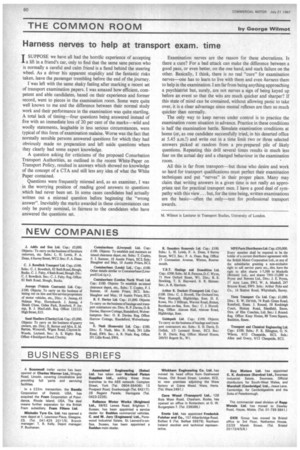Harness nerves to help at transport exam. time
Page 70

If you've noticed an error in this article please click here to report it so we can fix it.
TSUPPOSE we have all had the horrific experience of accepting a lift in a friend's car, only to find that the same sane person who is normally a careful and calm friend is a fiend behind the steering wheel. As a driver his apparent stupidity and the fantastic risks taken, leave the passenger trembling before the end of the journey. I was left with the same shaky feeling after marking a recent set of transport examination papers. I was amazed how efficient, competent and able candidates, based on their experience and former record, went to pieces in the examination room. Some were quite well known to me and the difference between their normal study work and their performance in the examination was quite startling. A total lack of timing-four questions being answered instead of five with an immediate loss of 20 per cent of the marks-wild and woolly statements, laughable in less serious circumstances, were typical of this form of examination malaise. Worse was the fact that normally sensible persons answered questions for which they had obviously made no preparation and left aside questions where they clearly had some expert knowledge.
A question asking for criticisms of the proposed Conurbation Transport Authorities, as outlined in the recent White-Paper on Transport Policy, resulted in answers which showed no knowledge of the concept of a CIA and still less any idea of what the White Paper contained.
Questions were frequently misread and, as an examiner, I was in the worrying position of reading good answers to questions which had never been set. In some cases candidates had actually written out a misread question before beginning the "wrong answer". Inevitably the marks awarded in these circumstances can only be purely nominal, in fairness to the candidates who have answered the questions set. Examination nerves are the reason for these aberrations. Is there a cure? For a bad attack can make the difference between a good pass, or even better, on the one hand, and stark failure on the other. Basically, I think, there is no real "cure" for examination nerves-one has to learn to live with them and even harness them to help in the examination. I am far from being anything approaching a psychiatrist but, surely, are not nerves a sign of being keyed up before an event so that the wits are much quicker and sharper? If this state of mind can be contained, without allowing panic to take over, it is a clear advantage since mental reflexes are then so much quicker than normally.
The only way to keep nerves under control is to practice the examination room situation in advance. Practice in these conditions is half the examination battle. Simulate examination conditions at home (or, as one candidate successfully tried, in his deserted office at 5.45 a.m.!) and write out in a time limit two or three selected answers picked at random from a pre-prepared pile of likely questions. Repeating this drill several times results in much less fear on the actual day and a changed behaviour in the examination room.
All this is far from transport-but those who desire and work so hard for transport qualifications must perfect their examination techniques and put "nerves" in their proper place. Many may claim that writing answers in a given time is not really an appropriate test for practical transport men. I have a good deal of sympathy with this view. ... but, for the time being, written examinations are the basic-often the only-test for professional transport awards.












































































































